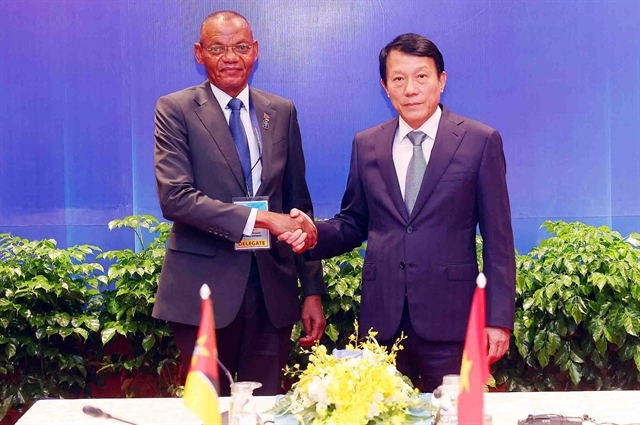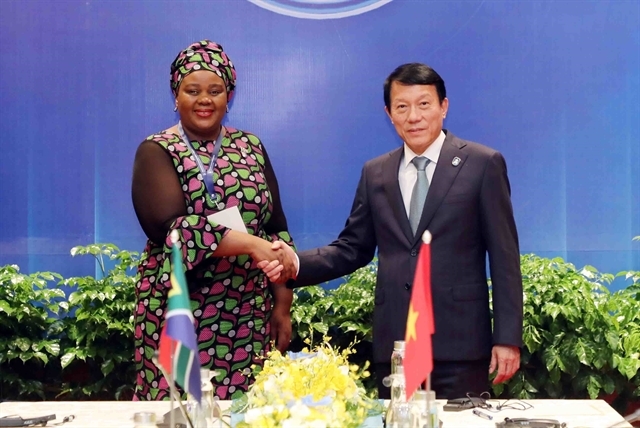During his meeting with Mozambican Minister of Interior Paulo Chachine, the two sides agreed to deepen the ties between the two countries and ministries by effectively implementing signed cooperation documents, enhancing information exchange, experience sharing, and coordination in investigation and criminal pursuit, particularly transnational crimes, drug trafficking, terrorism, human trafficking, and high-tech crime.
    |
 |
|
Minister of Public Security Luong Tam Quang (right) has a meeting with Mozambican Minister of Interior Paulo Chachine. |
They also agreed to expand cooperation in cybersecurity, making full use of the Hanoi Convention’s mechanisms for electronic evidence exchange, international investigative support, and technical assistance. They pledged to strengthen consultation and mutual support at international forums, especially within the United Nations and International Criminal Police Organization, thereby contributing to peace, stability, and sustainable development in the region and the world.
Chachine expressed confidence that, on the basis of bilateral traditional friendship and recent positive outcomes, cooperation between the two ministries will continue to advance in a substantive and effective manner, especially in combating transnational and cybercrime.
At his meeting with Azerbaijani Chief of the State Security Service Ali Naghiyev, the Vietnamese minister affirmed that Vietnam highly values its cooperation with Azerbaijan in the field of security, particularly after the two countries elevated their relationship to a strategic partnership and following agreements reached between the two ministries during Quang’s visit to Baku in May this year.
To further strengthen ties, the two sides agreed to promote the effective implementation of existing cooperation agreements, increase all-level delegation exchanges, and enhance information sharing and coordination among relevant agencies in combating transnational, terrorist, drug-related, high-tech and human trafficking crimes, as well as in preventing illegal migration.
They also agreed to step up training cooperation to improve the professional capacity of law enforcement officers and to support each other’s positions and policies at regional and international forums.
Immediately following their meeting, the two officials signed a cooperation agreement on security between the Vietnamese Ministry of Public Security and the State Security Service of Azerbaijan.
At his meeting with Iranian Deputy Foreign Minister for Consular, Parliamentary, and Iranian Affairs Vahid Jalalzadeh, Quang proposed that the Iranian side continue advising its Government to enhance cooperation with Vietnam in preventing and combating transnational and cybercrime, and to promote collaboration in security industry development, technology transfer, and production of security equipment to support national security and social order protection.
Vahid Jalalzadeh expressed his belief that the Hanoi Convention will open a new framework for cooperation grounded in respect for international law, equal dialogue, sustainable development, and humanitarian value. He affirmed Iran’s readiness to work alongside Vietnam and other international partners to translate today’s commitments into specific and effective actions in the future.
    |
 |
|
Minister of Public Security Luong Tam Quang (right) has a meeting with South African Minister of Justice and Constitutional Development Mmamoloko Tryphosa Kubayi. |
At a meeting with South African Minister of Justice and Constitutional Development Mmamoloko Tryphosa Kubayi, Quang expressed his delight that over the three decades since the two countries established diplomatic relations in 1993, bilateral ties have been continuously strengthened and expanded across various fields, including politics, economy, society, defense and security, education, and law. Vietnam always treasures the friendship and precious support South Africa has extended to the Southeast Asian country throughout its journey of integration and development.
Quang noted that in the field of law enforcement, the two countries have maintained effective cooperation through multiple channels, particularly via the International Criminal Police Organization (INTERPOL) and other international forums. The two sides have coordinated in handling cases related to environmental crimes and the illegal trade and transport of endangered wildlife, an area with great potential for further cooperation.
Besides, the two sides are actively discussing in order to early sign key legal documents such as an extradition treaty, an agreement on the transfer of sentenced persons, a cooperation agreement on crime prevention, and a memorandum of understanding on combating wildlife trafficking, he said.
They agreed to accelerate the completion and signing of these legal instruments to establish a framework for judicial and law enforcement cooperation. The two countries will strengthen information exchange and experience sharing in investigation, hunting wanted persons, and extradition, particularly concerning transnational, cyber, terrorist, drugs, and human trafficking crimes.
They also agreed to expand training and personnel exchange between law enforcement agencies to enhance capacity in tackling high-tech crimes. They pledged to coordinate and support each other at international forums, especially in implementing the Hanoi Convention, contributing to strengthening the role and voice of developing countries in global cybersecurity.
For her part, T. Kubayi said the meeting and the signing ceremony of the Hanoi Convention marked an important milestone, opening a new chapter in cooperation between the Vietnamese Ministry of Public Security and the South African Ministry of Justice and Constitutional Development, not only in cybersecurity but also in broader areas for peace, stability, and prosperity of both nations, as well as for Asia and Africa.
Receiving Rita Mikbel, President and CEO of Ericsson Group for Vietnam, Laos, Cambodia, and Myanmar, Quang stressed that Mikbel's visit to attend the signing ceremony of the Hanoi Convention followed up his successful trip to Sweden in September. It also demonstrated Ericsson’s strong interest in supporting Vietnam’s progress in science, technology, digital transformation, artificial intelligence (AI), and new-generation telecommunications.
The minister reaffirmed that, with a strategic vision toward a secure and sustainably developing digital Vietnam, the Ministry of Public Security highly values partnerships with capable and reputable international technology firms.
He recognized Ericsson as a global leader in innovation, particularly in AI and new-generation telecommunications, and praised its contributions to addressing non-traditional security challenges, from cybercrime and high-tech terrorism to data security and social safety.
Quang also highly appreciated Mikbel’s insights on digital transformation and AI development, especially in strengthening the capacity of Vietnam’s MobiFone Corporation.
Both sides agreed to advance collaboration in cybersecurity, jointly research AI-based security solutions for protecting 5G and 6G network infrastructure from cyber threats, and develop a secure digital data ecosystem and sovereign AI data centers in Vietnam.
On this occasion, Quang proposed Ericsson share its experience and transfer technology for building and operating new-generation mobile networks. He emphasized that technology transfer, particularly in producing 5G and 6G equipment, will be a strategic step toward Vietnam’s goal of technological self-reliance.
He also suggested Ericsson organize training programs to develop a high-quality Vietnamese technical workforce and to establish joint research programs on secure communication protocols, radio spectrum management for 5G/6G technology, and AI applications in network management.
Source: VNA